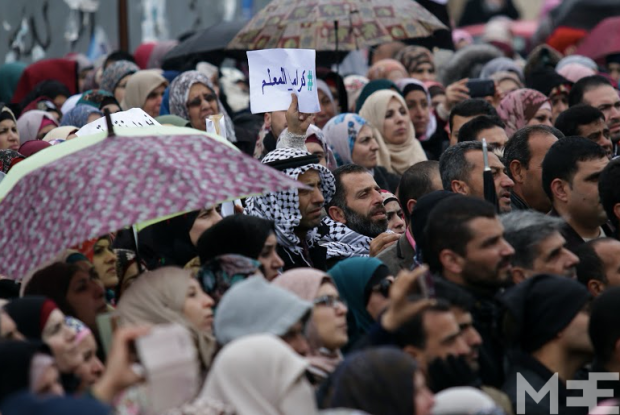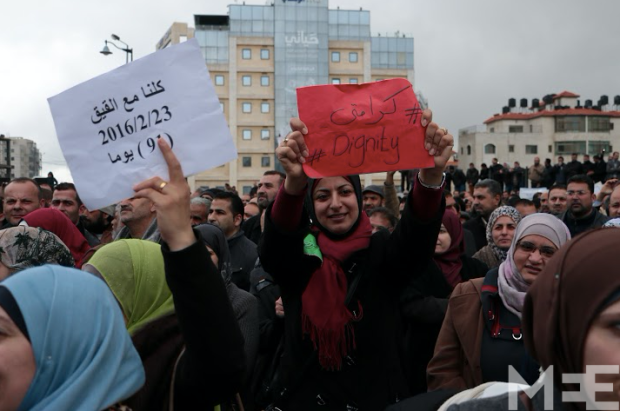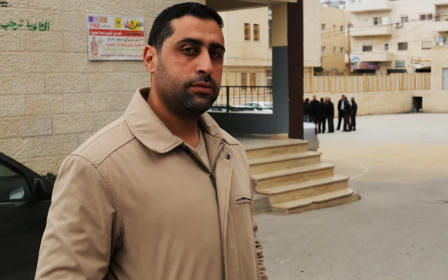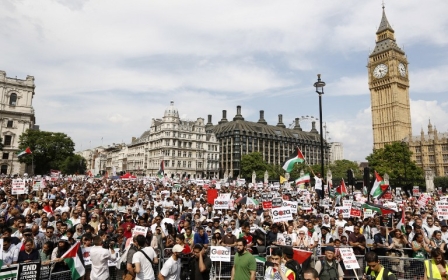'March of 50,000' Palestinian teachers defy roadblocks to protest pay
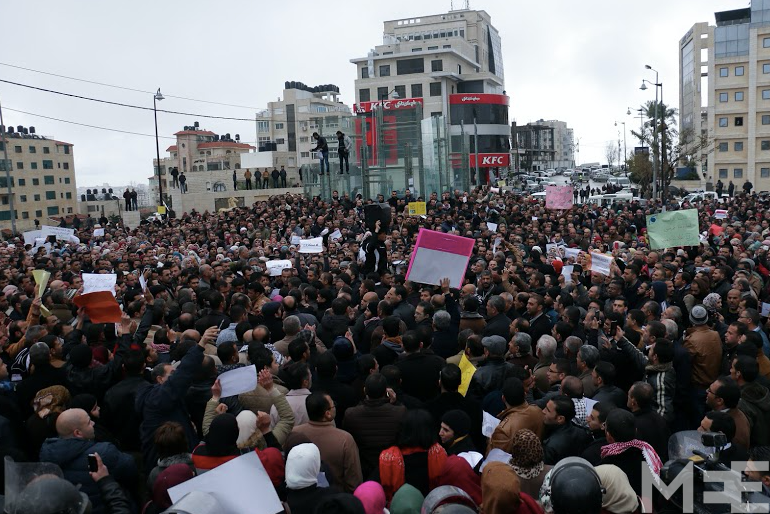
Ramallah, Occupied West Bank - Palestinian security forces threw a ring of steel around Ramallah on Tuesday in a vain attempt to prevent striking school teachers from marching on the headquarters of the Council of Ministers to demand better pay and employment rights.
Police set up checkpoints around the occupied West Bank's main city, stopping all vehicles, checking ID and turning away busloads of teachers, as other security forces surrounded the Council of Ministers building to prevent demonstrations by anyone who had slipped through.
But their efforts to prevent the march failed, as many teachers and their supporters managed to gather outside the government building to make their demands. Estimates suggested a crowd in the tens of thousands. Palestinian schoolteachers dubbed the Tuesday action "the march of 50,000 teachers" and sent thousands of invitations through social media pages and events yesterday.
The protest comes days after about 20,000 Palestinians demonstrated in Ramallah to call for the implementation of a 2013 agreement guaranteeing teachers' rights and now thousands of them in the West Bank are continuing their strike for the second week.
More than one million Palestinian children are believed to be impacted by the walk-out, which has seen some teachers stay out of classrooms day after day.
Sabah, a 38-year-old teacher from Birnabala village, said: "I arrived Ramallah after four hours of trying. I'm not a criminal, we are here to demand our dignity as others from government jobs - this is our right!"
Ahmad, a 44-year-old teacher in Ramallah, said teachers were calling for equality with other public sector workers.
"We just want is to be able to eat our bread in dignity," he said. "We demand equality with all other Palestinian Authority employees, we will not give up, and this strike will be continued until further notice or until the government responds to our demands."
However, hours of chanting brought no response from the Palestinian government and no officials came out to greet the protestors.
The government's only response so far has been to issue a media statement in which it renewed its commitment to implement the previous agreement by next month. The 2013 agreement laid out plans for salaries, raises and promotions, as well as other issues such as free tuition at public universities for the children of teachers.
It offered to increase pay by 2.5 percent and would add that to both the January and February salaries and said it wanted to do whatever it could to try to avoid postponing high-school exams.
The government also asked the teachers to follow the advice of their union - which stopped endorsing the strike last week following a meeting with PA officials - and appealed to them to return to work.
The head of the Palestine Teachers’ Union, Ahmad Suheil, last Thursday claimed that the strike had turned political and that only Hamas supporters were set to keep picketing, although many teachers have rejected this.
Doaa Qurei, the director of the Palestinian Non-Governmental Organisations Network, said: "This is a clear violation of all the rights guaranteed by the law, including the right to express their demands."
"We stand by the teachers and reject [a] partial solutions or a politicised solution... We also reject repressive measures taken by the police that have regularly been silencing people. It's this that has caused these dire consequences for the [Palestinian people] and [exacerbated] the internal situation in Palestine."
Last week, 20 teachers and two principals were rounded up and held for 24 hours without charge. Some complained of ill treatment and said that they were held in two-by-two metre cells.
Middle East Eye propose une couverture et une analyse indépendantes et incomparables du Moyen-Orient, de l’Afrique du Nord et d’autres régions du monde. Pour en savoir plus sur la reprise de ce contenu et les frais qui s’appliquent, veuillez remplir ce formulaire [en anglais]. Pour en savoir plus sur MEE, cliquez ici [en anglais].


